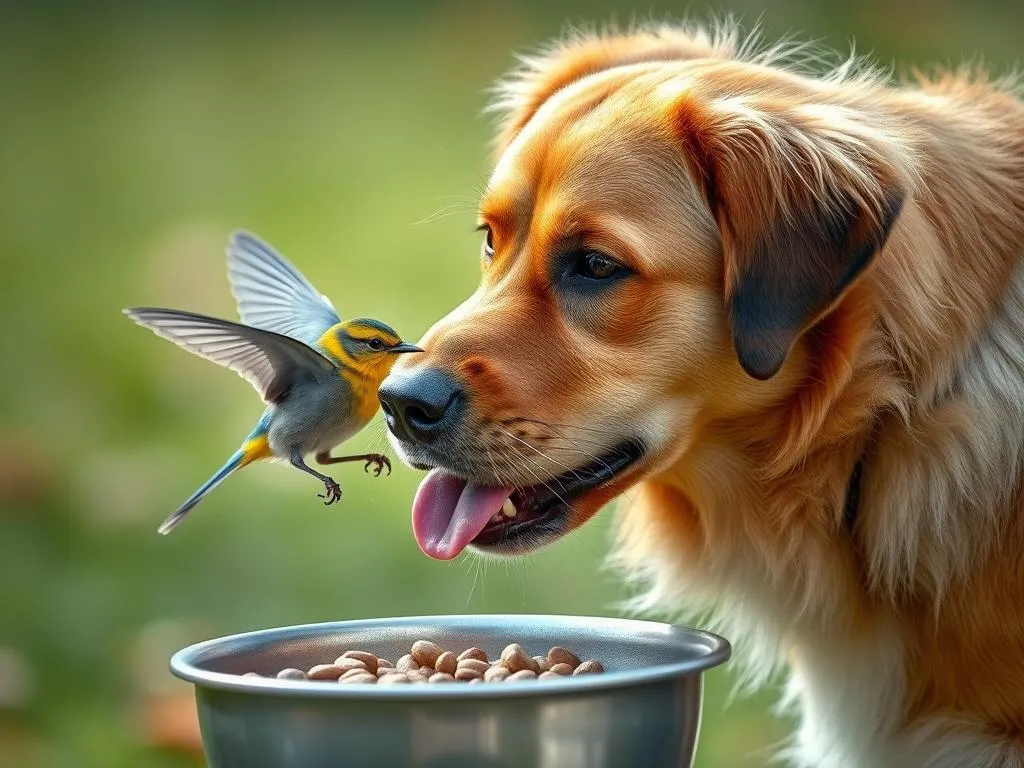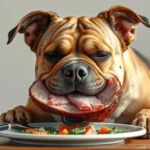
Introduction
Dog nutrition plays a critical role in the health and longevity of our furry companions. A balanced diet not only helps maintain their physical health but also influences their behavior, mood, and overall well-being. Unfortunately, many dog owners face the issue of wildlife, particularly birds, being attracted to dog food. This interference can pose several challenges, from contamination risks to potential health issues for both dogs and birds. Understanding the importance of keeping birds away from dog food will help you protect your pet and maintain a clean feeding environment. In this article, we will explore various strategies to keep birds away from dog food while ensuring your dog receives optimal nutrition.
Understanding Dog Nutrition
Importance of Proper Nutrition for Dogs
A balanced diet is essential for a dog’s health and longevity. Just like humans, dogs require specific nutrients to thrive. Poor nutrition can lead to several health issues, including obesity, diabetes, dental problems, and even certain cancers. Providing the right nutrition helps support your dog’s immune system, energy levels, and overall happiness.
Essential Nutrients for Dogs
A dog’s diet should include a mix of essential nutrients:
- Proteins: Vital for muscle development and repair.
- Carbohydrates: Provide energy and support digestive health.
- Fats: Important for skin and coat health, as well as energy.
- Vitamins and Minerals: Support various bodily functions and prevent deficiencies.
- Water: Essential for hydration and overall health.
Types of Dog Food Available
When it comes to dog food, there are several options available, each with its own benefits:
- Dry Kibble: Convenient and helps maintain dental health.
- Wet Food: More palatable and provides additional moisture.
- Raw Diets: Mimics a dog’s natural diet but requires careful handling.
- Homemade Diets: Allows for full control over ingredients but requires nutritional knowledge.
Recognizing Nutritional Needs Based on Factors
Each dog has unique nutritional requirements influenced by various factors:
- Age: Puppies, adults, and senior dogs have different dietary needs.
- Breed: Large breeds may require different nutrients than small breeds.
- Activity Level: Active dogs need more calories than sedentary ones.
- Health Status: Dogs with specific health conditions may require special diets.
The Problem of Birds and Dog Food
Why Birds are Attracted to Dog Food
Birds can be surprisingly attracted to dog food due to its nutritional value. Common culprits include sparrows, pigeons, and even larger birds like crows. These birds are opportunistic feeders and often see dog food as an easy meal source, especially if it’s left out in the open.
Risks Associated with Birds Eating Dog Food
Allowing birds to feed on dog food can lead to several risks:
- Health Risks for Dogs: Birds can carry diseases that may be transmitted to dogs, such as salmonella and avian influenza.
- Contamination of Dog Food: Waste left by birds can contaminate the food, leading to potential health hazards for your dog.
- Behavioral Issues: Competition for food can lead to anxiety or aggression in dogs, affecting their overall behavior and mental health.
Strategies to Keep Birds Away from Dog Food
Feeding Practices
One effective strategy for how to keep birds away from dog food is to adjust your feeding practices.
- Timing of Feeding: Consider scheduled feeding times rather than leaving food out all day. This can help minimize the opportunity for birds to snack on your dog’s food.
- Portion Control: Only feed your dog what they can eat in one sitting. This reduces the likelihood of leftover food that can attract birds.
Feeding Locations
The location where you feed your dog can make a big difference in deterring birds.
- Recommended Places: Feed your dog in an enclosed space, such as a garage or laundry room, where birds cannot easily access the food.
- Elevated Feeding Stations: Using elevated feeding stations can help keep food out of reach of birds while allowing your dog to eat comfortably.
Bird Deterrents
Implementing various deterrents can significantly reduce bird interference.
- Physical Barriers: Use dog food covers or containers designed to keep pests away. Airtight containers can also prevent odors that attract birds.
- Visual Deterrents: Hang reflective objects, like old CDs or shiny streamers, around the feeding area to scare birds away.
- Auditory Deterrents: Noise-making devices, such as wind chimes or battery-operated alarms, can help keep birds at bay.
Natural Solutions
Consider using natural solutions to deter birds while remaining safe for your dog.
- Bird-Repellent Plants: Planting species like lavender or rosemary around feeding areas can help repel birds naturally.
- Dog-Friendly Repellents: Certain non-toxic sprays can be applied around feeding areas to discourage birds without harming your dog.
Maintaining a Clean Feeding Environment
Regular Cleaning of Feeding Areas
Keeping the feeding area clean is crucial in preventing bird attraction.
- Importance of Cleanliness: Regularly cleaning the area removes any leftover food or waste that can lure birds.
- Recommended Cleaning Practices: Use a mild detergent to wash bowls and feeding areas, ensuring no residue is left behind.
Safe Storage of Dog Food
Proper storage of dog food is essential to deter pests, including birds.
- Best Practices: Store dog food in airtight containers to keep it fresh and free from contamination.
- Types of Containers: Look for sturdy, pest-proof containers that can withstand pecking or gnawing by birds and other animals.
Observing and Adjusting
Monitoring Bird Activity
Keeping an eye on bird activity can help you understand the level of interference.
- Assessing Interference: Take note of how often birds visit the feeding area and which types are attracted to the food.
- Tools for Monitoring: Consider using a camera or simply observing at different times of the day to gauge bird behavior.
Adjusting Feeding Strategies
Being flexible with feeding strategies is key to keeping birds away.
- When to Change Feeding Locations: If birds continue to be a problem, consider moving the feeding area to a more secure location.
- Keeping a Journal: Documenting feeding habits and bird activity can help you identify patterns and adjust accordingly.
Conclusion
Maintaining proper dog nutrition is vital for your pet’s health, and keeping birds away from dog food is an essential part of that equation. By implementing the discussed strategies—ranging from feeding practices to natural deterrents—you can create a safe and healthy feeding environment for your dog. Regular monitoring and adjustments will further ensure your efforts are effective. A little diligence can go a long way in providing your dog with the nutrition they need while keeping unwanted visitors at bay.









